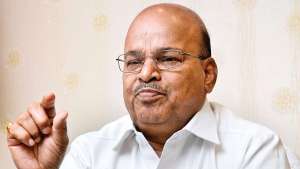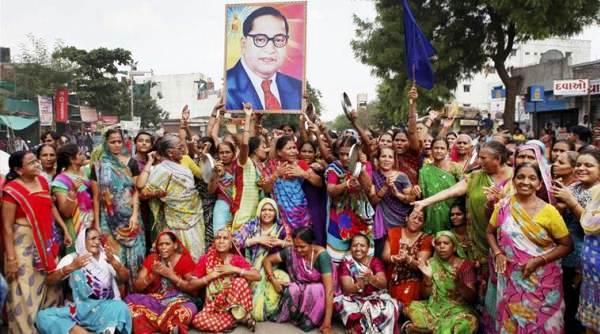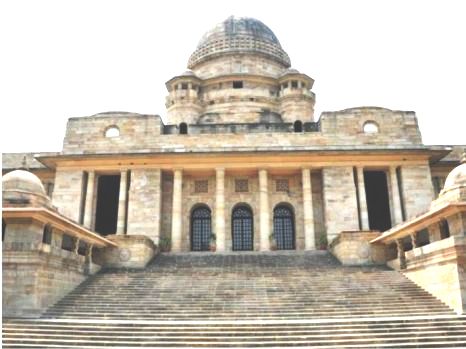The union government is planning to take a series of steps to ban the use of the word “Dalit”. While the government circular is based on court orders, it is also using a circular issued in 1990 by the union government as a pretext.
What this means is that in the future, the government will not use the word “Dalit” in its documents and instead use the term “Scheduled Castes” to refer to these communities. In the long term, this will translate into the government not providing funds for research on Dalit Literature and other issues concerning the community. The government will provide funds only when the Dalits are addressed as SCs.

The Union Ministry of Social Justice and Empowerment has issued a circular, asking state governments to stop using the word Dalit. The circular asks the governments to make sure that the word is not used in any official or non-official communication or document and that the communities concerned are addressed as SCs as in Article 341 of the Constitution. Two judgments of the Madhya Pradesh and Bombay High Courts have been cited in the circular.
Contained in the circular is a directive that was issued in 1990 by the Ministry of Welfare (now Ministry of Social Justice and Empowerment), in which it had asked governments to address Dalits as SCs. This has been done to implement the two judgments, in which the central and the state governments were directed to stop using the word.

The Union Ministry of Information and Broadcasting has also issued a circular to the media: “It is accordingly advised that media may refrain from using the nomenclature ‘Dalit’ while referring to members belonging to Scheduled Castes, in compliance with the directions of the Hon’ble Bombay High Court, and the Constitutional term ‘Scheduled Caste’ in English and its appropriate translation in other national languages should alone be used for all official transaction.”
In June, the Nagpur bench of the Bombay High Court had directed the Ministry of Information and Broadcasting to ensure that the use of the word Dalit is stopped in media within 90 days.
Sources in the ministry told FORWARD Press that the letter sent to the state governments refers to the earlier recommendations that it had made. The ministry has not referred to the orders of the high courts. The letter says that its 1990 directive should be followed and only the term “Schedule Caste” should be used and not “Dalit” or “Harijan” – that is, the directive issued 28 years ago should be implemented.

Here, it might be pertinent to mention that that before the Nagpur bench of the Bombay High Court, the Gwalior bench of the Madhya Pradesh High Court had also issued a similar order. The Gwalior bench had banned the use of the word Dalit in January this year while hearing a PIL. The Madhya Pradesh and Chhattisgarh governments have referred to the two orders in their communication to their officials.

Mohan Lal Mahaur had filed a public interest litigation (PIL) in the Madhya Pradesh High Court seeking a ban on the use of word Dalit as it finds no mention in the Constitution. The petitioner’s counsel Abhishek Parashar said that the order has been implemented in Madhya Pradesh.
The litigant behind the PIL in the Nagpur bench of the Bombay HC was Lalit Meshram. His counsel S.R. Narnaware told the court that the Union Ministry of Social Justice and Empowerment had already advised against the use of the word in the communications of the union government. When he requested the court to ban the use of the word in the media, a bench of Justices B.P. Dharmadhikari and Z.A. Haq suggested the Ministry of Information and Broadcasting write to the Press Council of India on the matter.
The Ministry of Social Justice and Empowerment has said in its circular that the Ministry of Home Affairs had issued a directive to the states on 10 February 1982 asking them not to use the word “Harijan” while issuing caste certificates and use “Scheduled Caste” instead. It has also cited the Ministry of Welfare’s circular issued on 18 August 1990, asking the states to use the word “Anusuchit Jati” as the Hindi equivalent of SC.
What do Dalits and OBCs say
BAMCEF, a leading organization of the Dalits, has been demanding a ban on the word for a long time. Its leaders say that the word is humiliating and so the term “Scheduled Caste” that Babasaheb Ambedkar coined should be used.

A section of the OBCs contends that addressing the SCs as Dalits creates confusion. There are many government programmes and funds that are meant for all the deprived classes. But, helped by the use of the word Dalit, the upper crust of the SCs usurps all the benefits. The use of the term SC would ensure a more just distribution of resources.
On the other hand, a number of Dalits want the use of the word to continue. Dalit thinker Chandrabhan Prasad says, “People want that they should be addressed as Dalits and not SCs. The fact is that the government is afraid of the word ‘Dalit’ and that is why it is using the Constitution as a pretext to banish it.”
Sunny M. Kappikad, a social activist and writer from Kerala, says, “By banning the use of the word, they want to deprive the community of its strength and the space it has created for itself. For us, Dalit means oppressed, dejected and broken people.” Similarly, well-known writer and Dalit activist A.S. Ajit Kumar says that Dalits have already rejected the attempt to replace the word with Harijan on political and ideological grounds. He says, “A call to Dalits mobilizes a large number of people to fight for their rights. The governments do not want that they should remain united.”
Social activist Rekha Raj says that it is not mandatory for the states to follow the directive of the union government but Rajasthan, Madhya Pradesh and Chhattisgarh governments have already issued orders to ban the use of the word Dalit.
What the RSS says
The RSS has always been opposed to the use of the words “Dalits” and “Adivasis”. They want the Dalits to be addressed as Scheduled Castes and the Adivasis, as Vanvasi (forest dwellers). They know very well that Dalit is an umbrella term, which includes all deprived classes. The use of the word ensures that the OBCs also join the struggle of the Untouchables, thus enhancing their strength. Addressing them as SCs would weaken their movement. They also know that the use of the word “Adivasi” implies their ownership of the country’s resources. On the other hand, if they are known as forest dwellers, the arguments for removing them from the forests will be stronger. In fact, those associated with the RSS have been opposing the concept of “Bahujan” too because it is an even broader concept than “Dalit” and has the potential for uniting all the deprived communities. Intellectuals associated with RSS’s sister organizations had targeted Forward Press for presenting the concept of Bahujans.
Dalits are angry
The members of the Dalit community in Chhattisgarh have criticized the Raman Singh government for banning the use of the word. They say that the government is under an illusion that this would swell its vote bank. According to Ramesh Varliyan, a Dalit leader, this is nothing but an election gimmick. “The political party that has so far shown no respect for Dalits has suddenly become worried about ‘respect’ of the SCs,” he says.
Translation: Amrish; copy-editing: Anil
Forward Press also publishes books on Bahujan issues. Forward Press Books sheds light on the widespread problems as well as the finer aspects of Bahujan (Dalit, OBC, Adivasi, Nomadic, Pasmanda) society, culture, literature and politics. Contact us for a list of FP Books’ titles and to order. Mobile: +917827427311, Email: info@forwardmagazine.in)
The titles from Forward Press Books are also available on Kindle and these e-books cost less than their print versions. Browse and buy:
The Case for Bahujan Literature
Dalit Panthers: An Authoritative History






